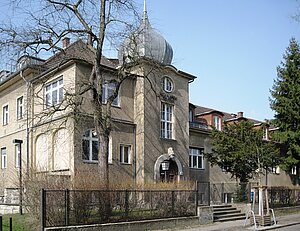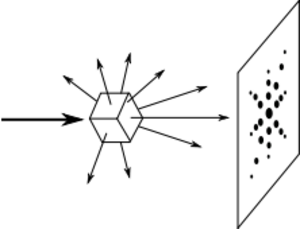Max von Laue
* 9. October 1879 in Pfaffendorf (Koblenz) † 24. April 1960 in Berlin
1898 Study of Physics and Mathematics in Strasbourg, Göttingen, Munich and Berlin
1903 Dissertation under Max Planck
1905 Assistant for Planck
1906 Habilitation
1909 Private Lectureship in Munich
1912 Professorship in Zürich
1914 Professorship in Frankfurt
Nobel Prize in Physics
1916 Corporate research with Wilhelm Wien at the Julius-Maximilians-Universität
1919 Transition to Berlin
Deputy director of the Kaiser-Wilhelm-Institute under Einstein
1943 Premature retirement
1951 Head of the Kaiser-Wilhelm-Institute for physical Chemistry and Electrochemistry
The Universitätsarchiv Würzburg returns from its summer break with the scholar of the month for September 2018. Max von Laue - Laureate of the Nobel Prize in Physics - only worked at the Julius-Maximilians-Universität for a short period of time, nevertheless did the University Würzburg have one of the brightest scholars of his time and a courageous critic/ opponent of the National Socialism with him.
One of the big boys
Max von Laue was lucky enough to be able to build the foundation of his future academic reputation during his study: As a student – and later friend – of Max Planck, he managed to get in contact with one of the most respected German physics, an acquaintance which was very beneficial for von Laue. In 1906 he also met Albert Einstein and hence became an early advocate of the special theory of relativity, as well as a good friend of Einstein. Not least because of this friendship, von Laue felt closely connected to Berlin, which at that time accommodated the most highly gifted German physics. Despite setting important impulses for his research during his times in Munich, Zürich, Frankfurt and Würzburg, Berlin had a special attraction to von Laue, which he could follow in 1919 after a job swap that was unique in the University History of Germany.
A sharp mind and a broad interest
Von Laues prominence did certainly not only consist of his close relations to famous science colleagues. There are good reasons for him being awarded the Nobel Prize in 1914: Only two years prior, von Laue, together with two of his students, namely Walter Friedrich and Paul Knipping, was able to kill two proverbial birds with one stone. By sending the at that time newly discovered X-rays through a crystal, he could on the one hand prove on basis of the interference phenomenon inside the crystal their diffusion as waves and on the other hand get important information about the atomic structure of the crystal. Besides the X-rays, von Laue occupied himself with a variety of different topics, for example with the research on amplifier tubes together with Wilhelm Wien during his time in Würzburg, which was highly relevant for the field communication during World War I.
Preparation for the time after the National Socialism
The political development after 1933 meant a deep recess for Max von Laue and many of his German colleagues. Unlike most of them, von Laue clearly positioned himself from the beginning on against Antisemitism and the “Deutsche Physik” of Philipp Lenard and Johannes Stark. At a physics conference in Würzburg in 1933 he even advocated Einstein and continued to call him the discoverer of the theory of relativity, something that many of his colleagues avoided to do out of cautiousness. The Reichskultusministerium (ministry of cultural affairs in the Third Reich) even admonished him several times before eventually forcing him into premature retirement in 1943. When asked why he didn’t emigrate like other scientist, Max von Laue always answered that he wanted to help to build the foundation of the rebuilding of Germany after the self-predicted end of the Third Reich. Even after the end of the Second World War and the short detention of von Laue through the allies because of an indirect connection to the German uranium project, the physicist continued to work for well-known physical institutes and publically militated against a possible atomic armament.


Recommended Readings:
Beck, Friedrich: Max von Laue, in: Bethge, Klaus / Klein, Horst: Physiker und Astronomen in Frankfurt, Frankfurt a. M. 1989, S. 52-75.
von Laue, Max: Die Relativitätstheorie, 2 Bde., Wiesbaden 81965.
Zeitz, Katharina: Max von Laue (1879–1960). Seine Bedeutung für den Wiederaufbau der deutschen Wissenschaft nach dem Zweiten Weltkrieg, Stuttgart 2006.


